中考英语专题复习动词教学案
中考英语词汇专题复习教案
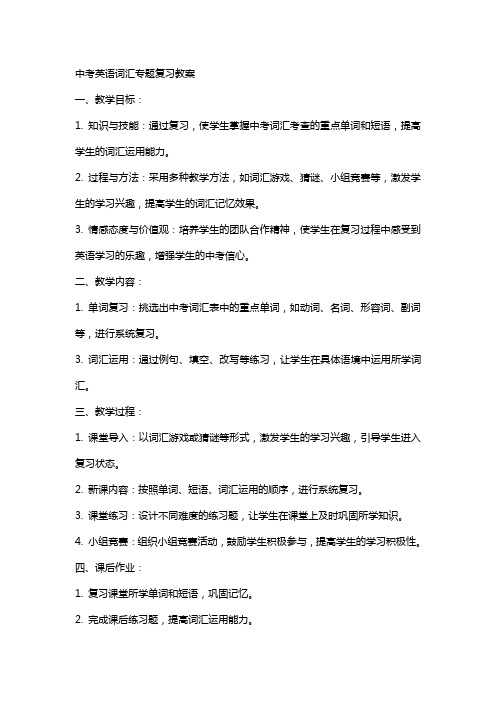
中考英语词汇专题复习教案一、教学目标:1. 知识与技能:通过复习,使学生掌握中考词汇考查的重点单词和短语,提高学生的词汇运用能力。
2. 过程与方法:采用多种教学方法,如词汇游戏、猜谜、小组竞赛等,激发学生的学习兴趣,提高学生的词汇记忆效果。
3. 情感态度与价值观:培养学生的团队合作精神,使学生在复习过程中感受到英语学习的乐趣,增强学生的中考信心。
二、教学内容:1. 单词复习:挑选出中考词汇表中的重点单词,如动词、名词、形容词、副词等,进行系统复习。
3. 词汇运用:通过例句、填空、改写等练习,让学生在具体语境中运用所学词汇。
三、教学过程:1. 课堂导入:以词汇游戏或猜谜等形式,激发学生的学习兴趣,引导学生进入复习状态。
2. 新课内容:按照单词、短语、词汇运用的顺序,进行系统复习。
3. 课堂练习:设计不同难度的练习题,让学生在课堂上及时巩固所学知识。
4. 小组竞赛:组织小组竞赛活动,鼓励学生积极参与,提高学生的学习积极性。
四、课后作业:1. 复习课堂所学单词和短语,巩固记忆。
2. 完成课后练习题,提高词汇运用能力。
3. 自主学习拓展词汇,增加词汇量。
五、教学评价:1. 课堂表现:观察学生在课堂上的参与程度、发言情况等,了解学生的学习状态。
2. 课后作业:检查学生的作业完成情况,评估学生的学习效果。
3. 单元测试:定期进行单元测试,检验学生对中考词汇的掌握程度。
4. 学生反馈:听取学生的意见和建议,不断调整教学方法,提高教学质量。
六、教学策略:1. 多样化教学:运用图片、视频、音频等多种教学资源,丰富教学手段,提高学生的学习兴趣。
2. 情境教学:创设真实的生活情境,让学生在语境中学习词汇,提高词汇的运用能力。
3. 联想记忆:引导学生运用联想记忆法,帮助学生记忆单词和短语。
4. 巩固练习:通过课后作业、课堂练习等形式,及时巩固所学知识。
5. 反馈与评价:定期进行教学反馈,了解学生的学习情况,调整教学策略。
中考英语 情态动词复习教案(表格式)
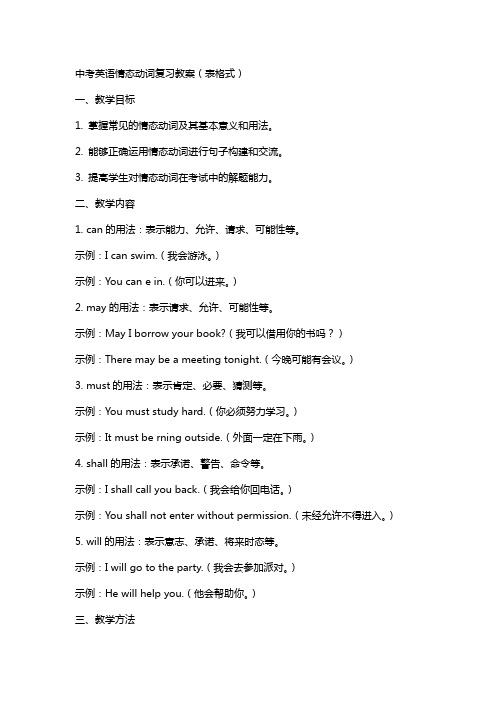
中考英语情态动词复习教案(表格式)一、教学目标1. 掌握常见的情态动词及其基本意义和用法。
2. 能够正确运用情态动词进行句子构建和交流。
3. 提高学生对情态动词在考试中的解题能力。
二、教学内容1. can的用法:表示能力、允许、请求、可能性等。
示例:I can swim.(我会游泳。
)示例:You can e in.(你可以进来。
)2. may的用法:表示请求、允许、可能性等。
示例:May I borrow your book?(我可以借用你的书吗?)示例:There may be a meeting tonight.(今晚可能有会议。
)3. must的用法:表示肯定、必要、猜测等。
示例:You must study hard.(你必须努力学习。
)示例:It must be rning outside.(外面一定在下雨。
)4. shall的用法:表示承诺、警告、命令等。
示例:I shall call you back.(我会给你回电话。
)示例:You shall not enter without permission.(未经允许不得进入。
)5. will的用法:表示意志、承诺、将来时态等。
示例:I will go to the party.(我会去参加派对。
)示例:He will help you.(他会帮助你。
)三、教学方法1. 实例讲解:通过具体例句讲解每个情态动词的用法。
2. 表格对比:列出各情态动词的用法表格,进行对比分析。
3. 练习巩固:设计相关练习题,让学生巩固所学内容。
4. 小组讨论:分组讨论情态动词的用法,促进学生互动。
四、教学步骤1. 导入:简要介绍情态动词的概念及重要性。
2. 讲解:分别讲解每个情态动词的用法,并结合实例演示。
3. 对比:展示各情态动词用法表格,让学生进行对比分析。
4. 练习:设计练习题,让学生进行课堂练习。
5. 讨论:分组讨论练习题,引导学生互相交流心得。
初三中考英语动词短语辨析教案含答案

初三中考英语动词短语辨析教案含答案一、选择题1.Judy waited a long time for her mom, but she didn't ________.A.show up B.get up C.wake up D.stay up 2.Sometimes results will just ________ opposite of our wish. We need to accept them anyway. A.carry out B.break out C.run out D.turn out3.The meeting was supposed to ________ on Tuesday, but we’ve had to put it off.A.turn on B.turn out C.take place D.take up 4.—Excuse me, does Mr. Smith’s son live here?— He ________ be here. But now he ________ in the city.A.used to; is used to live B.was used to; is used to livingC.used to; is used to living D.is used to; used to live5.—Sorry to ________ your valuable time.—It’s OK.A.take off B.take up C.take out D.take in6.The director of Up series passed away, and the workmates are thinking about whether the documentary can ________ without him.A.carry on B.carry out C.take on D.take out7.This bus doesn’t go to the train station. I am afraid you will have to ________ at the next stop and take BRT Line 1.A.get out B.get off C.get through D.get down 8.—We have waited for Tom for half an hour. Why hasn’t he ________ yet?—He may have got lost. Let me call him.A.cheered up B.taken up C.stayed up D.shown up9.It’s rude and impolite to ________ before others while everyone is queuing to buy tickets. A.take in B.cut in C.put in D.break in10.Last week a fireman came to our school and told us what to do if a fire ________. A.breaks out B.works out C.puts out D.runs out 11.—Aunt Lexie, could you please teach me how to _________ "red envelope" on WeChat?—Certainly. It goes like this.A.give away B.give up C.give back D.give out 12.Please _____ the water when you brush your teeth.A.take down B.turn up C.take away D.turn off13.I’ve had some difficulties, but they were nothing compared _____ yours.A.to B.of C.for D.from14.The book is written by T. C.Smith.What does the “T. C.”?A.pay attention to B.regard as C.stand for D.set off 15.—Dad,would you please____a brighter light in my bedroom?—Certainly.A.put in B.hand out C.hand in D.put out 16.Scientists need to ________ several surveys before making a conclusion.A.give up B.carry out C.hear of D.look for 17.—What can I do for you, Linda?—I hope you can help me ________ the useless words in my article.A.make up B.cut out C.turn off D.put up18.My father always tells me to ________ any possible challenge myself instead of giving up easily!A.take away B.take off C.take up D.take on 19.—The Civil Code (民法典) ________ to be a big success and it is a milestone in our country legal science.—I can’t agree more.A.turns out B.puts out C.takes out D.breaks out 20.The rain has stopped. Why not ________ the raincoat?A.take away B.pass away C.put away D.put off 21.Volunteers ________ leaflets to encourage more people to separate rubbish correctly. A.put out B.find out C.hand out D.turn out 22.There’s no doubt the Belt and Road will successfully ________ cooperation and development between China and other countries along the line.A.push for B.care for C.look for D.hope for 23.Would you please ____________ the light? I can't sleep well with it on.A.turn on B.turn off C.turn to D.turn around 24.— How can I get good grades in the listening test, Miss Lin?— You can the questions quickly before listening.A.look through B.go over C.pay attention to D.take notice of 25.—I’m sorry to ________ on you, but there is something I don’t understand.—It doesn’t matter.A.cut down B.cut out C.cut in D.cut off26.Far water does not ________ near fire.A.put up B.put away C.put out D.put in27.Muc h to everyone’s surprise, Hi, Mom ________ to be a biggest hit.A.turns out B.puts out C.carries out D.breaks out 28.—Oh, my God! I have ________ 5 pounds!—No worries. It’s normal for a growing teenager.A.put up B.put down C.put on D.put off29.I promise I won’t ________ any more of your time. But would you please reply to my question right away?A.give up B.make up C.put up D.take up30.We are supposed to ________ smart phones and take more exercise instead.A.put up B.put away C.put on D.put out 31.Steve Jobs was a great man who ________ the use of digital music.A.pushed away B.pushed for C.pulled out D.put in 32.—Many students don’t know how to ________ stress and become worried.—I think they’d better ask their teachers for help.A.argue with B.come up with C.deal with33.Bob is busy taking the desks and chairs away because they ___________ too much room in the hall.A.pick up B.take up C.put up D.cheer up 34.—All right, I’ll take it. But I tell you, it is the last time I will _________ this kind of wo rk —Come on, Buddy! Don’t be so serious.A.take off B.take out C.take on D.take up35.I know how busy you must be and naturally I wouldn’t want to ________ too much of your time.A.take on B.take away C.take up D.take off36.— Excuse me, which is the way to Kaiming Middle School?—________ this street, and you’ll find it on your right.A.Write down B.Go down C.Lie down D.Sit down37.My brother often _________ his spare time to help me with my spoken English.A.puts up B.gives up C.opens up D.tidies up38.We should ________ the job bravely instead of complaining too much. It’s our duty! A.take away B.take up C.take on D.take off 39.Children’s Day is on the way. Many shops have ________ huge posters with the word “SALE”. A.put on B.put in C.put away D.put up 40.Every time a serious disease ________, city planners will come up with new ideas to fight it. A.breaks down B.breaks out C.breaks into D.breaks up41.I know how busy you must be and naturally I wouldn’t want to ________ too much of your time.A.put up B.take up C.give up D.make up 42.—Why did Linda come to China?—To experience Chinese culture and ________ the most suitable university to attend.A.turn out B.put out C.run out D.find out43.The person who ________ a new idea of how to work out the puzzle will be given a(n)________.A.keeps up with; praise B.comes up with; prize C.ends up with; price D.puts up with; award44.—Your spoken English is very good. How do you improve it?—Thanks. Mrs. Wang always asks us to ________ dialogues in our English classes and practice speaking English as often as possible.A.take up B.make up C.put up D.mop up45.—What do the students think of this book?—It’s really a good book. They all________it.A.look over B.think about C.think highly of D.win the heart of 46.—Who is the best basketball player in your class?—Daniel. And he takes any chance to ________ his sports skills to girls.A.take off B.turn off C.fall off D.show off47.If parents do everything for their children, they won’t learn to ________ themselves. A.depend on B.get on C.put on D.come on48.My father is crazy about DIY. He’s trying to ________ a cupboard in the kitchen.A.put up B.put in C.put on D.put away 49.—Have you made a plan to raise money to protect the animals in danger?—Yes. Now we are thinking about how to ________.A.pick it out B.carry it out C.find it out D.put it out 50.Based on local cultures and museums, schools should develop local courses ________ art, history, geography, and biology.A.led to B.taken on C.chosen from D.connected with 【参考答案】***试卷处理标记,请不要删除一、选择题1.A解析:A【详解】句意:Judy等妈妈很长时间,但是她没有出现。
中考英语备课指导:英语专题讲义:动词(带答案)

中考英语专题讲义:动词(带答案)学科老师辅导讲义实义动词:有完整的词义,并能单独作谓语,实义动词又可分为及物动词和不及物动词。
例如:表示能力,义务,必要,猜测等说话人的语气或情态。
情态动词只能和动词原形5. Computers __________solve many dif ficult problems quickly.6. It ________ be fantastic if more students join in2. There is still quite a lot of meat in the fridge, so you __________ buy any mo re.C. needn'tA.6) be good at/ do well in doing sth.satisfying感到担心的A. not drinkingB. not drinkC.don't dri nkD. not to drinkC)clean D)B. doing二、英语书面表达专项训练2.今天手机在我们日常生活中已广泛使用。
但中学生在学校是否应该持有手机,一些学生和老师有不同的观点。
你们学校的校刊英文版正在就此举行征文活动,请根据下列表格提示的内容,用英语写一篇征文。
要求:1. 表达清楚,语法正确,上下文连贯;`2. 必须包含表格所给的提示信息,并作适当发挥;3. 词数:80-100词左右(征文的开头已给出,不计入总词数)。
Mobile phones have been used widely in our daily lifetoday.__________________________________________________________________________ _______________________________________________________________________________ _______________________________________________________________________________ _______________________________________________________________________________ _______________________________________________________________________________ _______________________________________________________________________________ _______________________________________________________________________________ _______________________________________________________________________________ _______________________________________________________________________________ _______________________【答案】Mobile phones have been used widely in our daily life today. With the development of economy, mobile phones are more and more widely used in our daily life. However, some parents and teachers have different ideas about whether the students should use mobile phones at school.Some students are for it. They think that it is convenient to contact with parents. Mobilephones will make them more interested in learning so that they can learn more quickly and easily. Some teachers are against it.They think that some students can't control themselves and often play games. What's worse, some students cheat in exams by using mobile phones. Besides, using mobile phones too much does great harm to students' eyes.In my opinion, I think it is helpful for students to use mobile phones in a right way. Firstly,students can learn more knowledge using mobile phones. At the same time, parents and teachers should do something to help students. Only in this way can mobile phones be of help to their studies.【解析】【详解】本篇写作需注意要求中所提供的要点,不可遗漏。
人教版中考英语专题复习《动词专题》教学设计
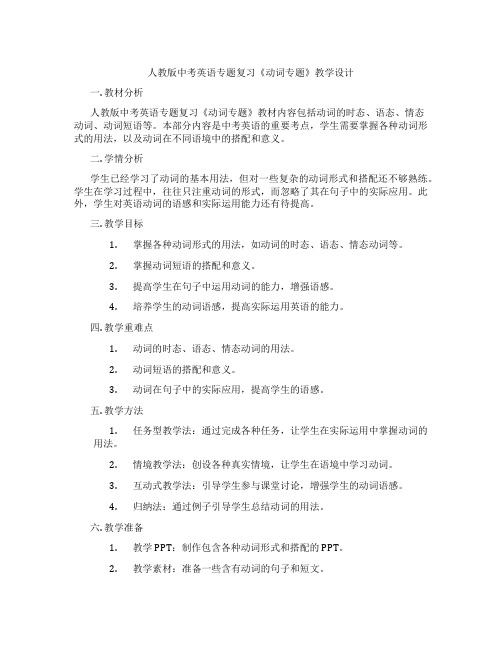
人教版中考英语专题复习《动词专题》教学设计一. 教材分析人教版中考英语专题复习《动词专题》教材内容包括动词的时态、语态、情态动词、动词短语等。
本部分内容是中考英语的重要考点,学生需要掌握各种动词形式的用法,以及动词在不同语境中的搭配和意义。
二. 学情分析学生已经学习了动词的基本用法,但对一些复杂的动词形式和搭配还不够熟练。
学生在学习过程中,往往只注重动词的形式,而忽略了其在句子中的实际应用。
此外,学生对英语动词的语感和实际运用能力还有待提高。
三. 教学目标1.掌握各种动词形式的用法,如动词的时态、语态、情态动词等。
2.掌握动词短语的搭配和意义。
3.提高学生在句子中运用动词的能力,增强语感。
4.培养学生的动词语感,提高实际运用英语的能力。
四. 教学重难点1.动词的时态、语态、情态动词的用法。
2.动词短语的搭配和意义。
3.动词在句子中的实际应用,提高学生的语感。
五. 教学方法1.任务型教学法:通过完成各种任务,让学生在实际运用中掌握动词的用法。
2.情境教学法:创设各种真实情境,让学生在语境中学习动词。
3.互动式教学法:引导学生参与课堂讨论,增强学生的动词语感。
4.归纳法:通过例子引导学生总结动词的用法。
六. 教学准备1.教学PPT:制作包含各种动词形式和搭配的PPT。
2.教学素材:准备一些含有动词的句子和短文。
3.练习题:设计一些针对性的练习题。
4.小组活动准备:划分学习小组,准备相关材料。
七. 教学过程1.导入(5分钟)利用PPT展示一些动词的图片,引导学生回顾动词的基本形式。
然后提问学生:“Can you tell me the past tense of the verb ‘like’?”,引出本节课的主题——动词。
2.呈现(10分钟)通过PPT展示动词的时态、语态、情态动词等,并用例子进行解释。
如:“I like apples.”(一般现在时),“I liked apples yesterday.”(一般过去时)等。
中考英语动词复习教学案

中考复习专项:动词(一)课型:主备:教师:备课组长:教研组长:班级姓名学号【教材分析】学习动词的分类及非谓语动词。
【学习目标】掌握几种动词的不同形式以及非谓语动词的三种形式的用法。
【课堂助学】一、分类1. 实义动词eat, drink, sleep, run, play…可分为:及物动词、不及物动词、延续性动词和非延续性动词2. 系动词look, sound, smell, keep, stay…〔后跟形容词做表语,组成系表结构〕状态类:be, stay, seem, keep感官类:feel, look, smell, taste, sound变化类:become, get, go, grow, turn★注意:系动词不能单独作谓语、系动词没有被动语态、不用于进行时除了be动词外,其他的系动词加形容词作表语3. 助动词do/does/did, have/has/had( 完成时中), will ,否认在助动词后直接加not, 问句直接把助动词提到主语前面4. 情态动词can, could, may, might, must, ought, should , need …等。
否认在后面直接加not,问句直接提前情态动词考点分析:1〕can/could, be able to区别: 两者都可以用来表示能力。
can只有现在时(can)和过去时(could),而be able to可用于多种时态。
注: can与be able to,不能重复使用2〕can/could表示“可能性〞没有时间区别,can 可能性比could 大,表示逻辑上或理论上的可能性,而不是某种实际上将要发生或正在发生的可能性。
He couldn’t be at home.〔很可能不在家〕He can’t be at home.〔不可能在家〕3) can/could/may/might 表示“请求;许可〞要注意:can/could 提问时的答复e.g Could I use your bike, Mum? Yes, you can.辨析:Could you ride a bike last year? No, I couldn’t. But I can now.〔表能力〕4〕情态动词的否认: 局部情态动词的否认形式是情态动词考点之一.mustn’t 不准, 禁止needn’t没必要( = don’t have to )can’t 不能; 不可能may not 不可以; 可能不shouldn’t不应该( = ought not to )had better not 最好不要5〕need 用法A: 作为情态动词: I need not finish the work now .★注意对need问句的答复: --Must I finish the work today?--Yes, you must..// --No, you needn’t. // --No, you don’t have to ★needn’t 对其它情态动词的答复:--Shall I tell John about it? --No, you needn’t (don’t have to)B: 作为实义动词: We need to finish the work .(肯定)We don’t need to finish the work . (否认)C. 其它用法My bike needs repairing. == My bike needs to be repaired.二、非谓语动词(to do, doing, done)1. to do:动词不定式肯定形式:to do 否认形式:not to doA 常见的动词不定式的搭配want/would like/hope/decide/plan to doask/want/tell/invite/warn sb. (not) to do…It takes sb. some time to do…It’s +adj.+ of/for sb. to do…形容词/副词+ enough to do…too … to do…have no choice but to do…what to do…B 与不带to 的不定式的固定搭配make / let / have sb. do sthhad better (not) do sthwhy not/don’t you do…?would rather do than do…Would you please (not) do sth.?C 动词不定式在句中的作用1) 对我们来说学好英语很重要(主语〕________________________is important for us.It is important for us______________________.2) 他们不知道怎么做。
英语中考总复习专题(七) 动词语态学案
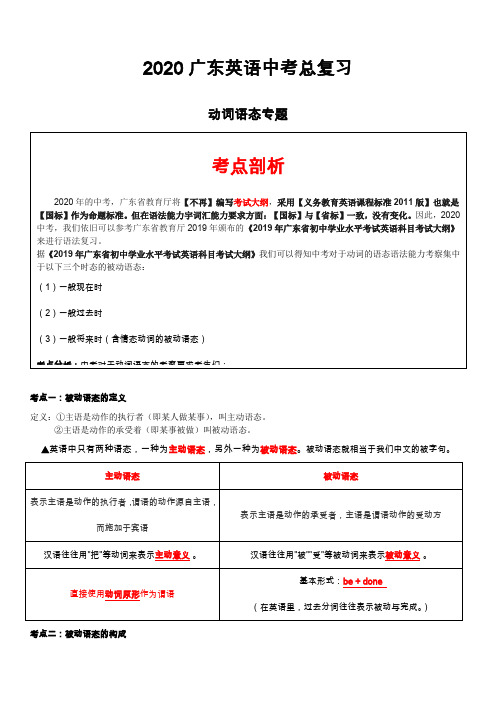
2020广东英语中考总复习动词语态专题考点剖析2020年的中考,广东省教育厅将【不再】编写考试大纲,采用【义务教育英语课程标准2011版】也就是【国标】作为命题标准。
但在语法能力宇词汇能力要求方面:【国标】与【省标】一致,没有变化。
因此,2020中考,我们依旧可以参考广东省教育厅2019年颁布的《2019年广东省初中学业水平考试英语科目考试大纲》来进行语法复习。
据《2019年广东省初中学业水平考试英语科目考试大纲》我们可以得知中考对于动词的语态语法能力考察集中于以下三个时态的被动语态:(1)一般现在时(2)一般过去时(3)一般将来时(含情态动词的被动语态)考点分析:中考对于动词语态的考察要求考生们:考点一:被动语态的定义定义:①主语是动作的执行者(即某人做某事),叫主动语态。
②主语是动作的承受着(即某事被做)叫被动语态。
英语中只有两种语态,一种为主动语态,另外一种为被动语态。
被动语态就相当于我们中文的被字句。
考点二:被动语态的构成例:Kites is flown by him. 风筝被他放I was invited to the meeting last night. 我做完被邀请出席会议Cars will be sent abroad by sea. 汽车将通过海路被运往国外。
A great many letters can be written with the computer by him. 大量的信能被他用电脑写。
考点三:主动语态变被动语态(writing)步骤:①将主动语态的宾语改为被动语态的主语②将主动语态的谓语动词改为‘be done’③将主动语态的主词改为介词by之后的宾语,放在谓语动词之后(有时可省略)例:He cleans the room.→The room is cleaned by him.含直接宾语和间接宾语的主动语态改为被动语态时有两种情况:①把间接宾语改为被动语态的主语,直接宾语仍保留原位;②把直接宾语改为主动语态的主语,此时,间接宾语前要加介词to或for。
中考英语动词的复习教案
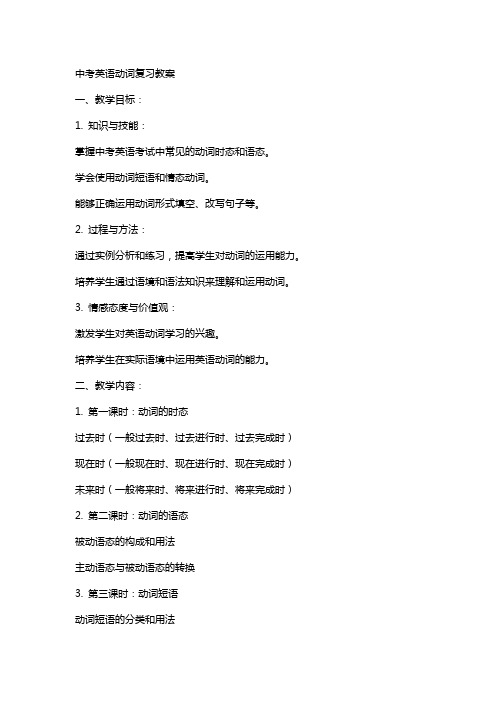
中考英语动词复习教案一、教学目标:1. 知识与技能:掌握中考英语考试中常见的动词时态和语态。
学会使用动词短语和情态动词。
能够正确运用动词形式填空、改写句子等。
2. 过程与方法:通过实例分析和练习,提高学生对动词的运用能力。
培养学生通过语境和语法知识来理解和运用动词。
3. 情感态度与价值观:激发学生对英语动词学习的兴趣。
培养学生在实际语境中运用英语动词的能力。
二、教学内容:1. 第一课时:动词的时态过去时(一般过去时、过去进行时、过去完成时)现在时(一般现在时、现在进行时、现在完成时)未来时(一般将来时、将来进行时、将来完成时)2. 第二课时:动词的语态被动语态的构成和用法主动语态与被动语态的转换3. 第三课时:动词短语动词短语的分类和用法动词短语在句子中的位置和搭配4. 第四课时:情态动词情态动词的分类和用法情态动词在句子中的位置和搭配5. 第五课时:动词填空练习根据语境选择合适的动词形式填空改写句子,运用不同动词形式三、教学过程:1. 课堂讲解:通过PPT展示和讲解,让学生了解动词的时态、语态、短语和情态动词的用法。
通过实例分析,让学生理解不同动词形式在句子中的作用。
2. 课堂练习:针对每个知识点,设计相关的练习题,让学生在课堂上进行练习。
老师对学生的练习进行点评和指导,及时纠正错误。
3. 课后作业:布置相关的课后作业,巩固所学知识。
要求学生在课后进行自主学习,提高对动词的运用能力。
四、教学评价:1. 课堂表现:观察学生在课堂上的参与程度和表现,了解他们对动词知识的理解和运用能力。
2. 课后作业:对学生的课后作业进行批改,了解他们的学习效果和存在的问题。
3. 单元测试:在学习结束后,进行单元测试,评估学生对动词知识的掌握程度。
五、教学资源:1. PPT课件:制作精美的PPT课件,帮助学生直观地理解动词的知识。
2. 练习题库:设计丰富的练习题库,供课堂练习和课后作业使用。
3. 教学视频:寻找相关的教学视频,让学生更直观地了解动词的用法。
- 1、下载文档前请自行甄别文档内容的完整性,平台不提供额外的编辑、内容补充、找答案等附加服务。
- 2、"仅部分预览"的文档,不可在线预览部分如存在完整性等问题,可反馈申请退款(可完整预览的文档不适用该条件!)。
- 3、如文档侵犯您的权益,请联系客服反馈,我们会尽快为您处理(人工客服工作时间:9:00-18:30)。
动词课题名称专题复习:动词复习课三维目标 1. 复习掌握四大类动词。
2. 熟练运用动词的时态。
重点目标1、2 难点目标 2导入示标目标三导学做思一:你们知道动词分为几大类吗?导学:实义动词He bought a story book. 他买了一本故事书。
(buy 为实义动词)及物动词和不及物动词根据其后是否带宾语,动词可分为及物动词(带宾语)和不及物动词(不带宾语)。
如:When will he arrive? 他什么时候到?(arrive 不带宾语,为不及物动词)He reached Beijing yesterday. 他昨天到达北京。
(reach 带了宾语,为及物动词)有的动词既可用作及物动词也可用作不及物动词:The child is playing. 这小孩在玩。
(不及物用法)The child is playing the piano. 这小孩在弹钢琴。
(及物用法) 助动词助动词本身无词义,不能单独作谓语,只能和主要动词一起构成谓语动词,表示否定,疑问及动词的时态、语态、人称和数等语法特征,助动词有 be,do,have,shall,will等。
如:How do you usually come to school?The children are playing yo-yo now.连系动词连系动词本身有一定的词义,但不能独立作谓语,必须与表语一起构成谓语。
常用的连系动词有 be, get, turn, become, look, feel, grow, seem, sound, taste, smell等。
如:Our country is becoming stronger and stronger.It feels damp.情态动词情态动词本身有一定的意义,但不能独立作谓语,只能和主要动词原形一起构成谓语,表示说话人的语气和情态。
情态动词没有人称和数的变化。
情态动词有 can (could),may(might),must, need, ought to, dare等。
如:Can I help you?- Must we go now? -No, you needn't .导做:( )1.—Must I turn off the light now?---No, you _______A. needn’tB. mustn’tC. c an’t( )2.Our teacher told us the sun ____ in the east. A. rose B. rises C. is rising( )3.He ___ back in a month.A. will comeB. comeC. came( )4.I ___ him before.A. metB. had metC. have met( )5.The teacher ____ to Japan this year. She’s now telling her pupils about it.A. wentB. has beenC. has gone导思:注意几个题:1)—May I go with you?—No, you _________.2)—Must I turn off the light now?—Yes, you ______/ No, you _________。
学做思二:你们知道动词有哪些时态吗?导学:A、动三单的变法1) “辅+y”结尾, 变y为i加es2) “以s; sh; ch; x; o结尾, 加es3)直接加s但have----hasB、现在分词的变法1)去e加ing (e不发音)2)双写加ing (“辅元辅”结尾且重读,y;w列外)3)直接加ingC、动词的过去式和过去分词(一)不规则变化(见课本不规则变化表P255)(二)规则变化1) “辅+y”结尾,变y为i加ed2)双写加ed3)直接加edA、动词不定式作宾补1)tell / ask / want sb to do ______________否定式:tell/ask/want sb not to do ______________________________2)省to不定式作宾补即:(l, m, n, 3h, 2看, 1f) sb dol—let; m—make; n—notice; 3h—hear, have, help; 2看—see, watch; 1f—feel但注意:1)help sb (to) do (to可省、可不省)2)在改作被动语态时省去的to应还原⎪⎪⎪⎪⎩⎪⎪⎪⎪⎨⎧⋯⋯⋯⋯⋯⋯⋯⋯(已做)记住已做了(未做)记住做(已做)忘记已做了(未做)忘记做停止做(正在做的事))停下来去做(另一件事::::::.3doing do to remember doing do to forget doing do to stop动作在进行)动作结束)((),,.(4doing do sb hear watch see(原来的事)继续做(另一件事)接着做⋯⋯⋯⋯::.5doing do to on go常可替换)((),,.6doing do to like start begin动原+⎪⎪⎭⎪⎪⎬⎫⎪⎪⎩⎪⎪⎨⎧than rather do to prefer please you Could would Will better had not Why //.78.介词+doingeg. 1)What/ How about doing2)be good at doing达标检测 用所给动词的适当形式填空1.Mother ________ (watch) TV every evening.2.We________(talk) when the teacher came in.3.He ________(go) to Beijing two days ago.4.He ________(leave) Chengdu in two days.5.Look! The boy________(play) football on the playground.6.My uncle ______(live) here for ten years.7.He often helps the old woman _______ (carry) water.8.Would you like to make a contribution to ________ (improve) our living conditions?9.Don’t forg et ________(turn) off the lights before you go out.10.Please let the girls _____(go) first.11.They had great fun ________(play) football this afternoon.12.Do you enjoy ________(watch) TV?13.Would you like ______(have) a cup of tea?14.You can ______(go) there tomorrow.15.Would you mind my _____(open) the door?16.Please ask him _______(speak) more loudly17.I’ll go fishing if it ____(be) fine tomorrow.18.He said his grandpa ________(be) dead for ten years.19.Tell the children __________(not play) in the street.20.Mr Zhu spent much time _________(help) me with my English.21.I’ll tell you as soon as he ____ (come) back.22.Each of us _____(want) to go to college.反思总结 1.知识建构2.能力提高3.课堂体验课后练习选择填空( )1.—Must I turn off the light now?---No, you _______A. needn’tB. mustn’tC. can’t( )2.Our teacher told us the sun ____ in the east. A. roseB. risesC. is rising( )3.He ___ back in a month.A. will comeB. comeC. came( )4.I ___ him before.A. metB. had metC. have met( )5.T he teacher ____ to Japan this year. She’s now telling herpupils about it.A. wentB. has beenC. has gone( )6.It ____ hard when I got home yesterday.A. rainedB. is rainingC. was raining( )7.Why not ____ again?A. to tryB. tryC. trying( )8.He has finished ____ the letter.A. writingB. to writeC. wrote( )9.It _____ every night.A. happensB. is happenedC. happened( )10.The policeman told the children ____ in the street.A. not playB. not to playC. don’t play( )11.The box is too heavy for me ____.A. to carry itB. to carryC. carrying it( )12.Stop ____and listen to the teacher.A. to readB. rea dC. reading( )13.He is still looking for a house ____.A. to liveB. to live inC. to live in it( )14.I heard her ___ when I passed her room just now. A. sing B. singing C. to sing( )15.—May I go with you ?---No, you ______.A. may notB. can notC. mustn’t( )16.There are some ____ in the river.A. airB. fishC. water.( )17.Sheep __ white and milk ___white, too.A. is ; isB. is ; areC. are ; is( )18.The class ___ going to see a film this afternoon.A. amB. isC. are( )19.Jim’s shoes ____ under the bed.A. areB. isC. was( )20.Three years ____ quite a long time.A. isB. areC. were( )21.The clothes are mine. Yours ____ under the bed.A. isB. areC. were( )22.There ___ a lot of news in today’s newspaper.A. isB. areC. were( )23.--Can you answer this question in English? No, I _____.A. needn'tB. mustn'tC. may notD. can't( )24. The teacher wanted us _____ Exercise 1, but you let me ______ Exercise 2.A.to do, doB. to do, to doC. do, to doD. do, do( )25. Miss Green saw a wallet ______on the ground when she walked past the school gate.A. lieB. lyingC. liesD. to lie( )26.What have you done _____ the milk? I've just _____ it.A. with, eatenB.for, eatenC. with, drunkD. for, drunk( )27.The radio _______ it will get warmer later.A. saysB. speaksC.talksD. tells( )28. You must be very tired. Why not _____ a rest?A. stop havingB.stop to haveC.to stop havingD. to stop to have( )29. Li Ping is young, but he _____ many places of interest in South China.A.went toB. has been inC.has gone toD. has been to( )30. Mother told me _____ in the sun.A. not readB. don't readC. read notD. not to read( )31.Do you often see her ______ volleyball on the playground?A. playB. playedC. playsD. to play( )32.Alice didn't hear what the teacher said just now,so she doesn't know how _______ the problem.A. doB. didC. to doD. doing( )33.When the little boy ____someone coming upstairs,he stopped _____.A. heard…cryingB. listened…to cryC. heard…to cryD. lis tened…cry( )34.I ______ my ruler at home.Can I use yours,please?A. forgotB. have forgottenC. leftD. have left( )34.Jim _____ the good news to his classmates this morning.A. spokeB. toldC. saidD. tal ked。
